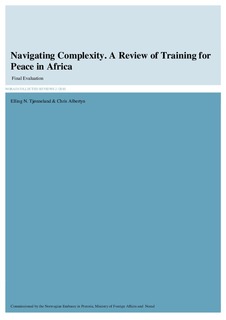Navigating complexity. A review of training for peace in Africa
Original version
Bergen: Chr. Michelsen Institute (Commissioned by Norad, the Norwegian Ministry of Foreign Affairs and the Embassy of Norway in Pretoria) 67 p.Abstract
Training for Peace in Africa (TfP) has, since its start in 1995, been provided with NOK 170 million to strengthen African capacities for participation in peace support operations. This includes NOK 70 million for the current third phase (2008-2010). The focus of TfP has been on the police and civilian components of multidimensional peace operations through training, research and policy advice. From the start NUPI was managing and coordinating the programme on behalf of the MFA. This ended in 2006 with the MFA assuming direct responsibility, first managed from HQ and from 2008 through the Embassy in Pretoria. Over the past five years the programme has expanded both geographically and in scope. In addition to the original implementing partners – Institute for Security Studies (ISS), African Centre for Constructive Resolution of Disputes (ACCORD) and the Norwegian Institute of International Affairs (NUPI) – TfP now also provides support to the Kofi Annan International Peacekeeping Training Centre (KAIPTC) in West Africa, and to the planning element of the Eastern African Standby Brigade (EASBRIG). The Norwegian Police Directorate has also been brought into the programme to help facilitate a major expansion of pre-deployment training of police officers. Interesting Findings
The review team’s overall conclusion is that TfP has been an important programme with highly relevant activities and outputs. It has achieved important outcomes and it has made a significant contribution to the evolving African Peace and Security Architecture, especially the conceptualisation of complex peace support missions and the role of the police and civilians in such missions. At the same time the review finds that outcomes have been uneven and that the programme has struggled with implementing suggested measures to enhance effectiveness and efficiency. This is partly the result of insufficient attention to programme management and planning for results. Trai
